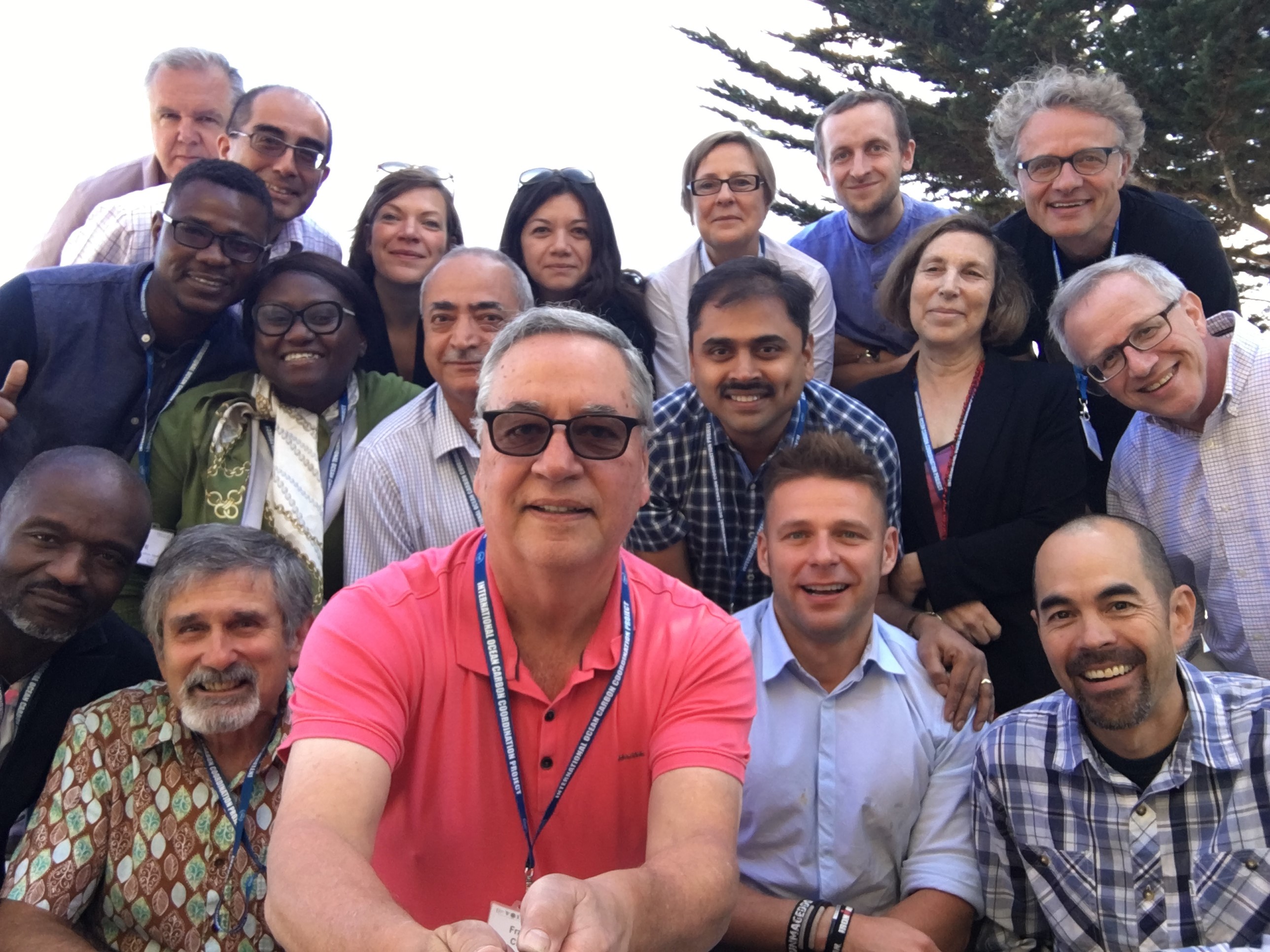We are happy to inform you about the publication of the report of the Variability in the Oxycline and its ImpaCts on the Ecosystem (VOICE) Science Plan Workshop which took place on 13-15 September 2017 in Monterey, CA, USA, and hosted by the Monterey Bay Aquarium Research Institute (MBARI). The workshop was a three-day event, held in conjunction with the Global Ocean Oxygen Network (GO2NE) third annual meeting (11-13 September 2017). The workshop was attended by 22 scientists from around the globe, and was the first opportunity to establish communication and initiate coordination of efforts leading to the implementation of the VOICE project, which is an outcome of the Implementation of Multi-disciplinary Sustained Ocean Observations (IMSOO) workshop in February 2017. The workshop was generously sponsored by GOOS, IOCCP, NOAA and SOLAS, and its organisation was facilitated by the IOCCP Office.
VOICE will assess the current readiness level of the observing requirements, existing observing capabilities and availability of data products to deliver information on the variability in the oxycline and its impacts on the ecosystem in selected OMZ regions around the globe: the Humboldt Current System, West Africa (Canary and Benguela Current Systems), Northern Indian Ocean, and the California Current System. The VOICE Science Plan Workshop provided an excellent and in depth summary of the regional requirements, observing capability, data and information product management to form a basis for comprehensive observing system readiness level assessment in accordance with the Framework for Ocean Observing guidelines.
You can access the workshop report as PDF from this site:
www.goosocean.org/voice-mbari-report
Background
In February 2017, the Global Ocean Observing System of the IOC-UNESCO (GOOS) and the OceanObs Research Coordination Network (OceanRCN) held a workshop to address the Implementation of Multi-Disciplinary Sustained Ocean Observations (IMSOO) in Miami, Florida, USA. This workshop identified priorities for improving the coordinated planning and implementation of multi-disciplinary observing activities and demonstrations. The IMSOO OMZ Demonstration Theme working group identified as their high level and overarching observing objective "How do changing OMZs affect the spatio-temporal distribution, productivity and trophic structure of the benthic and pelagic communities?" - and objective that include all three main drivers for a GOOS: Climate, Operational services and Ocean health. As an approach to design an observing system towards this overarching observing objective, the group decided to limit the design to the observations of one important control surface in the OMZ system - the oxycline. In the direct aftermath of the IMSOO workshop, the leaders of the IMSOO OMZ Demonstration Theme, supported by the GOOS Biogeochemistry Expert Panel coordinators, started planning for a workshop that would refine the proposed science plan for a project called ‘Variability in the Oxycline and its ImpaCts on the Ecosystem (VOICE),’ ambitiously laid out by the IMSOO OMZ participants.
If successfully implemented, VOICE would result in a blueprint of a multi-disciplinary sustained OMZ observing system, outlining a minimum and optimized set of observational and modelling requirements for a fit-for-purpose system, capable of informing the society about the variability in the oxycline and its impacts on the ecosystem, applicable within the global ocean observing system, and contributing to the overarching question: “How do changing OMZs affect the spatio-temporal distribution, productivity and trophic structure of the benthic and pelagic communities?”
Summary of workshop outcomes
The workshop provided an excellent and in depth summary of the regional requirements, observing capability, data and information product management to form a basis for comprehensive observing system readiness level assessment in accordance with the Framework for Ocean Observing guidelines. The information conveyed through presentations and during discussions will be documented and expanded upon through a spreadsheet questionnaire distributed among the workshop participants, to be filled out towards the end of 2017.

|
Participants of the VOICE Science Plan Workshop in Monterey, CA, USA. Top, from the left: Grant Pitcher, Dimitri Gutiérrez, Kirsten Isensee, Ivonne Montes, Véronique Garçon, Artur Palacz, Johannes Karstensen. Middle, from the left: Baye Mbaye, Carmen dos Santos, Wajih Naqvi, Damodar Shenoy, Lisa Levin, Kenny Rose. Bottom, from the left: Paulo Coelho, Tony Koslow, Francisco Chavez, Maciej Telszewski, Kevin Weng. Missing from the photo: Denise Breitburg, Marilaure Grégoire, Gil Jacinto, Elliott Hazen. |
Despite the fact that only a limited number of stakeholder groups could be represented at this workshop, the participants have agreed to assume the role of champions in their disciplinary and/or geographic domains, or in few cases, pointed at other experts potentially available to play that role. It is thus through the institutional functions and well-established professional networks of the champions that a continued dialogue with all relevant stakeholders is meant to be ensured.
A central point in the established plan of actions is the realization of a global literature review for VOICE. Specific means of achieving this tasks were proposed and actions undertaken. Recognizing the importance of performing historical data analyses prior to a successful VOICE conceptual model development, it was agreed that steps will be taken to initiate such analyses. In some cases, the data is readily available but additional resources and expertise is needed to carry out the work. In other cases, the focus will be on attempting to mobilize the existing data and information products, for example through unprecedented integration of oceanographic and higher trophic level data.
In order to enable progress of VOICE into its implementation stage beyond 2019, the group has agreed to review data sharing agreements by September 2018. The regional observing system champions will therefore act on the potential opportunities to increase access to local information and eventually report on the level of data availability for VOICE and the global community.
Furthermore, the outline for a common roadmap for GO2NE and VOICE presented in this report was deemed an important outcome with respect to enhancing coordination of observation and modelling efforts leading up to a better understanding of OMZ functioning, and in particular of deoxygenation and associated phenomena, as well as building awareness of their consequences. The development of the actual roadmap for OceanObs'19 and beyond will require refinements in the near future, in particular, through assigning persons responsible for implementation (that includes both coordination and fund-raising efforts) of individual recommendations and actions agreed upon.
The report provides a detailed account of arriving at the outcomes above, and include important information on many general as well as very specific issues that are critical to the development of the VOICE Science Plan and its future implementation.
Next VOICE meeting
The next VOICE meeting is planned for September 2018, around the SFB 754 International Conference on ‘Ocean Deoxygenation: Drivers and Consequences – Past, Present and Future’, 3-7 September 2018, Kiel, Germany. Stay tuned for more news on the exciting developments of VOICE.





 Please wait...
Please wait...